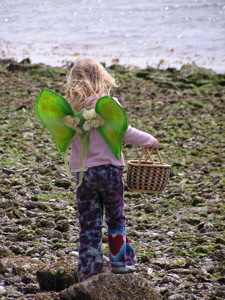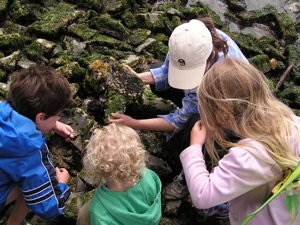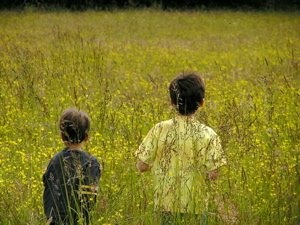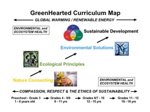Greening Our Schools — Transformative Education for Sustainability

Thank you for visiting! Please note, this is an old-fashioned website. It is, however, a calm and relaxing site (despite the state our world is in), filled with useful and fascinating info about transformative education for sustainability and greening the heart of education. It contains no ads that jump around or pages that pop up. It contains no gratuitous "white space" or stock photos that keep scrolling forever. And it contains no slickly disguised requests for your money (although we do have a Greening the Heart of Education course in the works!). But you will always know where the Nav Bar is! <—

GreenHeart Education is a primer on transformative education for sustainability.
Here you'll find what you'll need in order to genuinely "green" ...
- your classroom
- your curriculum
- your students' learning
- your school community
- and your life's work as a teacher.
It's all here, dedicated to all the children, of all species.
"We share one atmosphere, one climate system. It knows no borders. [...] Science shows that changes in the climate are widespread, rapid, and becoming more intense and affecting every part of the world. [...] It is now unequivocal that human influence is causing climate change, making extreme events more frequent and more severe. [...] Global warming of 1.5ºC and 2ºC will be exceeded during this century unless immediate, rapid, and large-scale reductions in greenhouse gas emissions, especially of carbon dioxide and methane, occur in the nearest future."
— Hoesung Lee, Chair of the UN Intergovernmental Panel on Climate Change, at COP26, 2021
If you're like me, you are feeling a sense of both foreboding and responsibility for your students and their future. Scientists report that we don't have many years left to transform our society to a renewable energy (zero-carbon) economy to avoid catastrophic climate change. What is our role as educators in creating this transformation?
If our students are going to contribute to the necessary societal transformation, they need to develop a deep bond with the rest of Nature, learn how life works on Earth, work together on creative solutions to environmental and other local and global problems, and become practitioners of sustainable development — at the appropriate grade and developmental levels. See Greening the Curriculum for a Green School Curriculum Map you can use.
— Dr. Richard Leakey, Paleoanthropologist and Environmentalist
Whether you teach preschoolers, primary-aged children, middle schoolers or older students — and if you've been following the news — you know that education has to become part of the solution if humanity is to safeguard the future. How can our schools contribute in deeply meaningful ways?
Think Gandhi's maxim: "Be the change you want to see in the world." Children learn what they live. Let's give them a place to "live" their school days that teaches them by example how to be stewards of the planet that sustains them. See School Greening.
"We ... find ourselves continually trying to accommodate new realities within inappropriate existing institutions, and trying to think about those new realities in traditional but sometimes dangerously irrelevant terms." — Gwynne Dyer, Journalist and Author
You might be feeling more than a little scared about a future defined by global heating and climate chaos, dwindling resources, war and injustice. Or perhaps you have a sense that what you're teaching is no longer relevant in light of 21st century realities. I know the curriculum where I live and work still doesn't mandate environmental education or education for sustainability. The powers-that-be keep tinkering with the curriculum — tweaking it without transforming it. This does not fill me with hope!
If the all-too-real "doom and gloom" has you feeling down, start envisioning — and then try to find ways to work towards — a zero-carbon future of safer, cleaner, healthier, more peaceful, more equitable, and more beautiful renewable energy instead! Transformative education for sustainability can start with a simple change in our focus or context. What if everything we taught, we were to teach with the Earth, the future, and the children of all species in mind — and heart? See Transformative Tools for Sustainability Education.
"There is virtually nothing in the literature addressing appropriate ways to deal with the emotions associated with environmental degradation." — Elin Kelsey, PhD, Environmental Educator and Communicator
Again, if you're like me, you worry — in between the planning, the marking, the report cards and the little bit of time you have for yourself and your family — about what kind of world we're leaving for our students. If you have your own children, you're certainly concerned about them, and perhaps your grandchildren, as well. And what must our students be feeling these days?
Our students need to know that the adults who care about them are doing all they can to protect the natural environment and safeguard the future for them. But are we? These young people also need opportunities to take action, because action is our only hope. See Reasons for Greening Your Teaching.
 Nature as Teacher
Nature as Teacher
You care about children, so your reaction to everything you've been hearing and learning about climate change and other dire global issues is natural, and heartfelt. Because you care about kids, you care about their future, and the future of their planet. And you don't want to stick your head in the sand.
If transformative education for sustainability resonates for you, it's probably because you don't want to teach for UNsustainability, which is our current default. But where to start?
Right here! You'll find ideas, answers, support — a kind of online professional development — for greening the heart of your teaching.
GreenHeart Education gives you a simple yet transformative model of education for sustainability, especially useful if you're just starting out on your greening journey, or doing it without the backing of your school community or educational jurisdiction.
Even if you're not a teacher but simply a member of the human family who wants to put sustainability into action, you'll find lots of beyond-the-usual ideas for greening your world and worldview, as well as support for advocating a transformation to sustainability-centered education.
Here's what you'll find on this website:
- the rationale for transforming our teaching to safeguard the future
- a research-based curriculum model for greening preschool to post-secondary school education
- simple transformative tools for making education part of the solution, starting today
- answers to your concerns about transformative education for sustainability and curriculum alignment
- ideas for greening your classroom and school facilities
- ways to encourage your school community to go green
(including colleagues, administrators, staff, students, parents, visitors)
And if you have questions or concerns, or ideas you'd like to share, please contact us.
Though it wasn't called that way back then, I've been working at "greening the heart of education" and transformative education for sustainability for over 30 years. So if you care about the future of our species, our home planet, and the rest of life on Earth, we are kindred spirits.
Teaching for a healthy, green future — that's what education for sustainability is (I wish it was the purpose of all education!) — shouldn't be lonely and difficult, but it can be. Often, it takes courage and support to walk your own green path — to create your own gift to the future. GreenHeart will give you that support and encouragement.

This is Education for Sustainability
Two of my favourite kids in a field of mustard, near our Pizza Garden
(Thanks to Wendi for these beautiful photos
of some of my students.)
Click on one of the tabs in the navigation bar on the left
or on a link below
to get started on this transformative journey to green
the heart of education....
- Compassionate Climate Action Blog
- A weekly blog of ideas for radical and compassionate action on climate change..
- Climate Change Primer
- This climate change primer gives teachers what they need to know about greenhouse gas pollution, and offers resources for teaching it.
- School Greening
- School greening means transforming your students' education, making sustainability the focus of curriculum and professional development, facilities and operations, and organizational behaviour.
- Greening the Curriculum
- Greening the curriculum (using this green school curriculum model) creates graduates who are ready to tackle 21st century challenges such as climate change.
- Greening School Facilities
- Greening school facilities is imperative because our students learn what they live. They should spend their learning time surrounded by energy efficiency indoors and naturalized playgrounds outdoors.
- Greening School Behaviour and Attitudes = Greening Our Ethic
- Greening school behaviour means applying an environmental / sustainability ethic to all decisions we make within our school community.
- Reasons for Greening Your Teaching
- Educators seeking reasons for greening their teaching will find a transformative, solid and salient rationale here.
- Integration as a Sustainability Teaching Tool
- Integration of sustainability learning into the rest of the curriculum is an ecological teaching tool that counters the dangers of reductionism.
- Transformative Tools for Sustainability Education
- A paper on transformative tools for sustainability education, presented by Julie Johnston at the World Environmental Education Congress in Durban, South Africa, July 2007
- Transformative Nature Study
- Transformative Nature study is experiential learning about organisms and natural objects, especially their origins and interrelationships, that helps students make friends with the rest of Nature.
- School Gardens
- School gardens are a great way to use the schoolyard as a classroom, reconnect students with the natural world, and teach them valuable food production skills that integrate with several subjects.
- Green Schools are Vegan Schools
- Green schools are vegan schools. Meat and dairy products at school are no longer cool because they contribute to global warming and climate change.
- Sustainable Family Development - Helping Families Go Green
- So many environmental efforts are aimed at individuals, but isn't the family a primary unit of change in our society? Sustainable family development helps families develop "green" competencies.
- Saying Grace Together
- Saying grace together at mealtimes is an excellent way to "practise gratitude" and grow closer together as a family or a class, in a way that teaches children where their food comes from.
- Prayers for the Earth
- Prayers for the Earth is a collection of graces and prayers from different cultures and religions around the world, as well as prayers to heal the oil spill.
- Child Honouring
- Child Honouring is a philosophy and way of life that puts care and concern for our children at the centre of all our decisions and everything we do personally and as a society.
- Greening Early Childhood Education
- Greening early childhood education (ECE) means giving preschoolers the gift of Nature.
- Postsecondary Sustainability Education
- Postsecondary sustainability education can start in every lecture theatre and lab, with every professor and instructor.
- Greening Homeschooling
- Greening homeschooling means allowing Nature to be a teacher in your child's education.
- Rights for Future Generations - An Economic and Political Solution
- Educational solutions are not enough. Our economic system needs transforming, and our political systems need to be reminded that future generations matter.
- Sustainable Development Learning
- Describes a master's in adult education thesis entitled Sustainable Development Learning as Enticement to Environmental Action.
- Barriers to Environmental Learning and Action
- The many barriers that keep adults from environmental learning and action can be categorized as cultural, psychosocial, adult learning, and environmental adult education barriers.
- Enticements to Sustainability and Environmental Learning and Action
- Enticements to sustainability are the cultural, psychosocial and educational ways to inspire and motivate environmental learning and action.
- References for Barriers and Enticements to Environmental Learning and Action
- A list of the references for a literature review on barriers and enticements to environmental learning and action, as part of a master's degree in (environmental) adult education.
- About Us
- GreenHeart Education's About Us page introduces Julie Johnston and Peter Carter, a teacher and a doctor, who together have over 35 years experience in the environmental / sustainability field.
- GreenHeart Education Services
- How do we green the heart of education? Here is a list of GreenHeart Education services that we offer.
- GreenHeart Education Testimonials
- Here is a sampling of GreenHeart Education testimonials – kind things that wonderful people have said about us – to show you how we can help you meet your goal of greening the heart of education.
- Contact Us
- Use this page to contact us at GreenHeart Education.
- Privacy Policy
- Privacy policy
- GreenHearted Blog
- Transformative environmental and sustainability education - ideas, experiences, steps to take for greening the heart of your teaching.
- GreenHeart Education Site Map
- GreenHeart Education Site Map
SEARCH THIS SITE
(scroll past Google's ads)
or visit our site map

